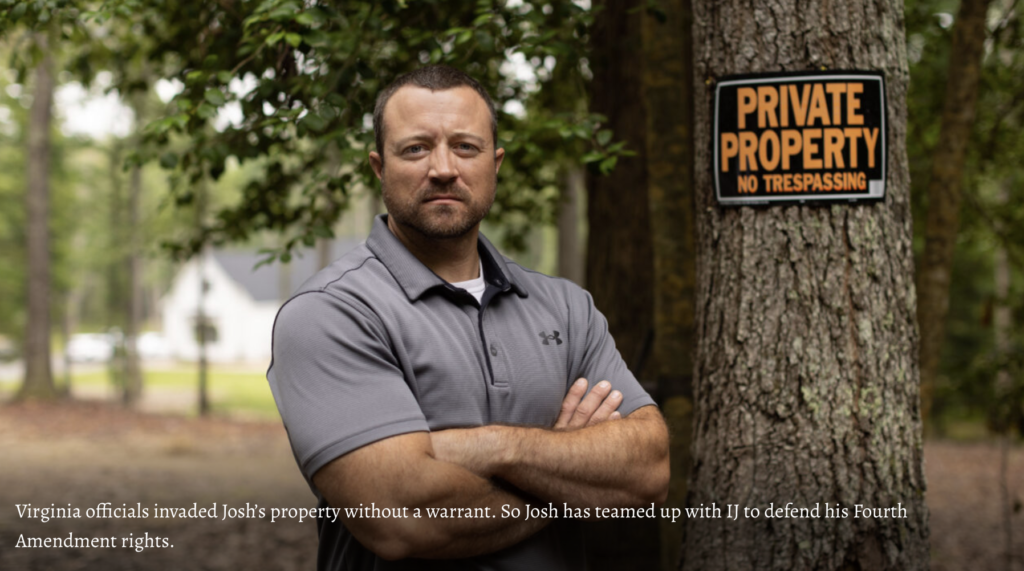“Josh soon discovered who the camouflaged prowler was. Game wardens from the Virginia Department of Wildlife Resources had sneaked onto his land to search for evidence of hunting violations.“
This is quite a story from the Institute of Justice. If you ever have questions as to who to donate to, this is the group to support.

REPRINT:
Josh Highlander bought 30 acres of land in Virginia at the end of a quiet residential street lined with single-family homes. He built a home there surrounded by woods. And he posted “no trespassing” signs around the perimeter of the property. Surely that was enough to secure his family’s right to privacy and seclusion on their own land, right?
Wrong, at least according to game wardens in Virginia and around the country. Ironically, they see the very things that most people think of as sources of privacy—like living on a large piece of property surrounded by nature—as an invitation to snoop on private land without a warrant. The U.S. Supreme Court greenlit these intrusions almost 100 years ago during Prohibition, when it held that the Fourth Amendment does not protect “open fields.” Under this misguided theory, the woods and fields around your home are not sources of seclusion but opportunities for government surveillance.
Josh found this out the hard way. His wife and young son were playing basketball in the yard when the ball rolled toward the woods. As Josh’s wife went to retrieve it, she noticed among the trees a stranger dressed in full camouflage. Alarmed, she rushed inside to alert Josh. By the time he got outside, the intruder was gone, but the violation of his family’s privacy remained. For weeks afterward, his son was afraid the stranger might be lurking in the woods again and wouldn’t go outside alone.
Josh soon discovered who the camouflaged prowler was. Game wardens from the Virginia Department of Wildlife Resources had sneaked onto his land to search for evidence of hunting violations. Earlier that day, game wardens had accused Josh’s brother of hunting over bait (an accusation he denies) miles away in a different county. Josh has never been cited for violating hunting regulations, but that day his family ties apparently cast suspicion on him, too.
What happened to Josh and his family is no aberration. Around the country, game wardens and other law enforcement routinely trespass on private land without a warrant to hunt for evidence. A key goal of IJ’s Project on the Fourth Amendment is to put an end to these warrantless intrusions onto private land. Our suit protecting Josh’s privacy under the Virginia Constitution joins IJ’s growing body of work fighting similar warrantless searches of open fields under the Pennsylvania and Tennessee constitutions.
As more state courts reject the misguided open fields doctrine, we hope to eventually persuade the U.S. Supreme Court to abandon the doctrine, too. But whether in federal court or state by state, we’ll continue this fight until all Americans regain their right to be secure against warrantless searches of their private land.
Joe Gay is an IJ attorney.
